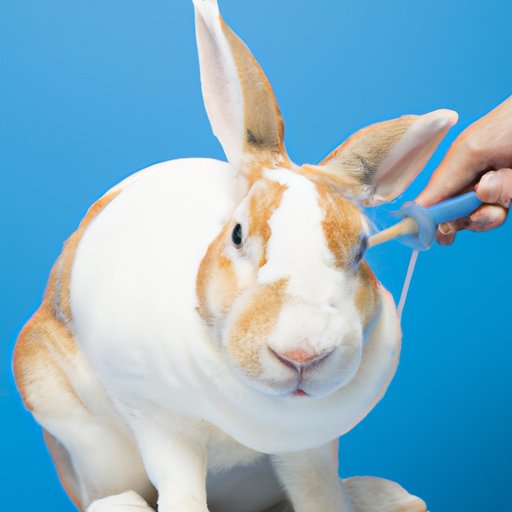Introduction
Rabbits are adorable and fluffy, but they require special care in order to stay healthy and happy. This article will provide an overview of the basics of rabbit care so you can ensure your furry friend is getting the best care possible.
Provide a Proper Diet
Giving your rabbit a balanced diet is essential for their health and wellbeing. The main component of their diet should be hay, such as timothy hay or oat hay. Rabbits also need fresh vegetables, such as carrots, kale, and broccoli, as well as a small amount of pellets. Treats should be given sparingly and should not exceed 10% of their daily caloric intake.
How much and how often you feed your rabbit depends on their age and size. Generally speaking, adult rabbits should have unlimited access to hay and 1/8 cup of pellets per 5 pounds of body weight per day. They should also receive one cup of fresh vegetables per 2 pounds of body weight per day. Young rabbits (under 6 months old) should have unlimited access to hay and 1/4 cup of pellets per 4 pounds of body weight per day. They should also receive 2 cups of fresh vegetables per 5 pounds of body weight per day.
Create a Comfortable Environment
Rabbits need a safe and comfortable place to live. The ideal housing option is a large enclosure with plenty of space for them to move around. The enclosure should be made out of a sturdy material, such as wood or wire mesh, and should have a solid bottom so your rabbit’s feet don’t get hurt. It should also be placed in a quiet area away from household traffic and other pets.
The temperature in your rabbit’s enclosure should stay between 55 and 75 degrees Fahrenheit. Humidity levels should stay between 30 and 50 percent. If the temperature gets too hot or too cold, make sure to adjust it accordingly.
Give Plenty of Exercise
Rabbits need plenty of exercise to stay healthy and happy. Types of activities that promote exercise include running, hopping, jumping, and digging. You can also create obstacles courses or tunnels for your rabbit to explore.
You can encourage your rabbit to exercise by providing toys, such as balls and chew toys, and offering treats as rewards. You can also let your rabbit play outside in a secure area, but make sure to watch them closely to prevent them from running away or coming into contact with predators.
Provide Mental Stimulation
Rabbits need mental stimulation to stay engaged and active. Providing toys and games, such as puzzle feeders and hide-and-seek, can help keep your rabbit’s mind sharp. You can also give your rabbit a variety of objects to explore, such as boxes and tubes.
Socializing your rabbit with other animals, such as cats and dogs, can also help provide mental stimulation. Make sure to introduce them slowly and supervise all interactions to ensure everyone stays safe.
Practice Regular Grooming
Grooming your rabbit regularly is important for keeping their coat and skin healthy. Brushing their fur once or twice a week can help reduce shedding and remove dirt and debris. Nail clipping should be done every three to four weeks, or as needed.
Bathing your rabbit isn’t necessary, but you can do it occasionally if needed. If you decide to bathe your rabbit, make sure to use a mild shampoo and rinse them thoroughly. Hair trimming can help keep long-haired rabbits cool in the summer, but should only be done by a professional groomer.
Monitor Health and Well-Being
Regularly monitoring your rabbit’s health and well-being is important for ensuring they stay healthy. Watch for signs of illness or injury, such as lethargy, lack of appetite, or excessive scratching. If you notice any changes in your rabbit’s behavior, take them to the vet right away.
Vaccinations and parasite control are also important for your rabbit’s health. Talk to your vet about which vaccines and treatments are best for your rabbit’s needs.
Conclusion
Taking care of a rabbit requires dedication and patience, but it can be a rewarding experience. By providing a proper diet, creating a comfortable environment, giving plenty of exercise and mental stimulation, practicing regular grooming, and monitoring health and well-being, you can ensure your rabbit stays happy and healthy for years to come.
If you have any questions about caring for your rabbit, make sure to talk to your vet. They can provide additional information and advice to help you give your furry friend the best care possible.


